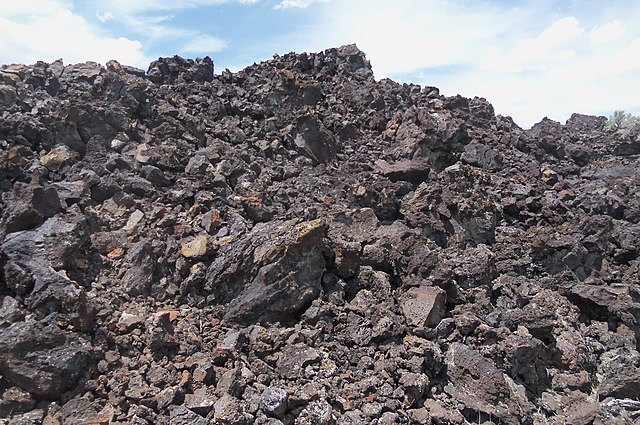
In the midst of a bustling quarry, Jim Mann holds a handful of unremarkable black rocks. Although they may appear insignificant, these pieces of basalt hold the potential to combat our planet’s escalating temperature through a process known as enhanced rock weathering.
Scientists from the United Nations (UN) have acknowledged that reducing greenhouse gas emissions alone will not be sufficient to prevent dangerous levels of global warming. Carbon dioxide removal, actively extracting it from the atmosphere, will be necessary. While tree planting is a natural method for achieving this, it has its limitations. The captured CO2 is released when the wood decomposes or burns, and there are constraints on the extent to which trees can be planted. On the other hand, Direct Air Capture (DAC) mechanically removes CO2 from the atmosphere and stores it underground, providing a permanent solution. However, considering our aim to reduce dependency on fossil fuels, it may seem counterintuitive to develop such energy-intensive processes.
Enhanced rock weathering falls between natural and man-made approaches. It accelerates the gradual weathering process that occurs naturally, allowing for faster carbon removal. Jim’s company, UNDO, specialises in enhanced rock weathering and has recently secured £12 million in new investment to expand its operations.
Surrounded by a desolate hillside being gradually excavated for the production of concrete and asphalt, Jim treasures the leftover basalt rocks. These rocks possess a unique property: when they weather in the rain, they absorb carbon dioxide from the atmosphere. Volcanic rocks and cliffs have been removing carbon through weathering for thousands of years. Enhanced rock weathering utilises smaller rock fragments to increase the contact area between rain and rock, thereby enhancing weathering and carbon removal.
As a cliff or pile in the quarry, basalt weathers very slowly. To maximise carbon removal, it needs to be spread across a larger area. This is where local farmers play a crucial role, simultaneously aiding the planet and receiving free fertiliser. Aside from sequestering carbon, trials have shown that basalt improves crop yields and grazing quality.
The scattering process requires no specialised equipment. A trailer is loaded with 20 tonnes of basalt, which is then dragged across the fields by a tractor. A rotating wheel at the back scatters the tiny rocks.
“It’s free of charge which is quite important to a farmer,” John Logan said, as the basalt is put on his field. He’d seen UNDO’s trials on a neighbouring farm.
“It looks like it’s going to make the grass better, so that can only be good for the cattle because they’re eating better grass.”
Some experts express concerns that carbon removal techniques like enhanced rock weathering may divert attention from the more pressing need to reduce emissions, potentially becoming a justification for continuing carbon-intensive practices.
“CO2 reduction has to come first, but we also need to be developing these technologies that can do removal at scale. And the nice thing about what we’re doing with enhanced rock weathering is it’s permanent.”
Admittedly, the scale of the challenge is formidable. UNDO’s scientists estimate that four tonnes of basalt rocks are required to capture one tonne of CO2. With an average Brit’s annual CO2 emissions estimated at around 7 tonnes, each individual would need approximately thirty tonnes, or one and a half trailer loads of basalt, to break even.
Nevertheless, UNDO plans to rapidly scale up its operations in the coming years and has garnered significant support. Microsoft has pledged to fund the scattering of 25,000 tonnes of basalt across UK fields. As part of the agreement, Microsoft will also assist in auditing the project and verifying its efficacy.
“The essential chemistry of it makes sense,” Dr Steve Smith, an expert in carbon removal from Oxford University, told me.
“Measuring how much CO2 would be taken out and where that ultimately goes, is one of the key challenges, and there’s no standardised system at the moment.”
Ultimately, Dr. Smith, a member of UNDO, envisions enhanced rock weathering becoming a standard practice in agriculture.
“It’s something that can be folded into the way we use land at the moment and deliver a carbon removal benefit alongside other benefits in terms of the way we use land for food and crops,” he says.
However, questions remain regarding scalability. UNDO’s current projects utilise by-products from local quarries. Yet, if this approach is massively expanded, the energy and emissions associated with grinding, transporting, and scattering the basalt will need to be considered.
“At this point in time, there’s no downside, It’s a win win for everybody involved.” Jim Mann said.
This year, UNDO plans to spread 185,000 tonnes of basalt, with hopes of removing one million tonnes of CO2 by 2025. Nevertheless, this is a mere fraction compared to global emissions. In 2022 alone, it is estimated that the world released approximately 37 billion tonnes of CO2 into the atmosphere.
——————————————————————————
At Natural World Fund, we are passionate about stopping the decline in our wildlife.
The declines in our wildlife is shocking and frightening. Without much more support, many of the animals we know and love will continue in their declines towards extinction.
When you help to restore a patch of degraded land through rewilding to forests, meadows, or wetlands, you have a massive impact on the biodiversity at a local level. You give animals a home and food that they otherwise would not have had, and it has a positive snowball effect for the food chain.
We are convinced that this is much better for the UK than growing lots of fast-growing coniferous trees, solely to remove carbon, that don’t actually help our animals to thrive.
This is why we stand for restoring nature in the UK through responsible rewilding. For us, it is the right thing to do. Let’s do what’s right for nature!
Donate today at https://naturalworldfund.com/ and join in the solution!

